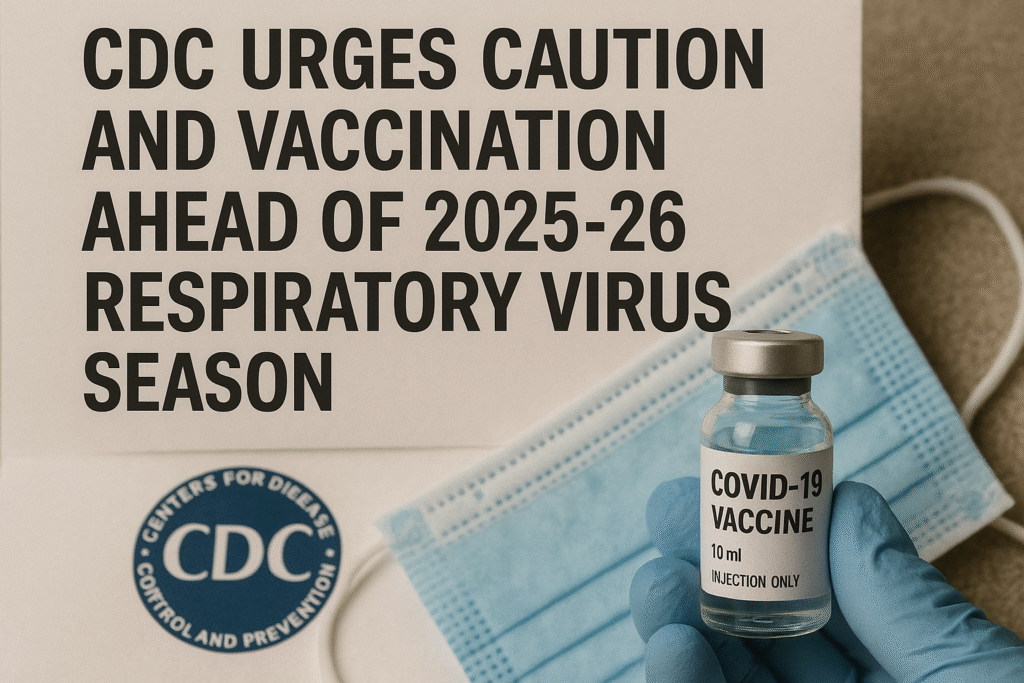By Harshit, WASHINGTON, D.C., October 16, 2025
As fall settles across the United States, the Centers for Disease Control and Prevention (CDC) is warning of a potential surge in respiratory illnesses, including Covid-19, influenza, and respiratory syncytial virus (RSV). Hospitalizations this season are expected to mirror the peaks seen last year, prompting health experts to stress vaccination and preventive measures as key defenses against severe disease.
Vaccines: Protection Beyond Prevention
“One common question I get is, ‘I got the flu shot last year or the Covid vaccine, but I still got sick. Why?’” said Dr. Mike Ren, assistant professor of family and community medicine at Baylor College of Medicine.
Dr. Ren explained that vaccines may not fully prevent infection, particularly in high-exposure situations, but they significantly reduce the severity of illness. “Vaccines prevent severe disease that can land you in the hospital or worse,” he said.
CDC data highlight the stakes: approximately 1 million people were hospitalized due to influenza last season, with up to 130,000 deaths, while Covid-19 led to nearly 540,000 hospitalizations and up to 63,000 deaths from October 2024 through September 2025.
Covid-19 Vaccination: Who, Where, and When
For the 2025-26 season, the CDC recommends Covid-19 vaccination for everyone 6 months and older, including pregnant individuals, through a shared-decision approach. This means individuals should consult a healthcare provider about the benefits and timing rather than relying on a broad federal recommendation.
“There isn’t an explicit directive to get a booster this year,” said Dr. Dan Barouch, director of the Center for Virology and Vaccine Research at Beth Israel Deaconess Medical Center. “But the vaccine is available to everyone who wants it.”
Three vaccines are available in the U.S.: Pfizer (ages 5+), Moderna (6 months+), and Novavax (12+). Pfizer and Moderna use mRNA technology, while Novavax uses a protein-based platform. Updated vaccines target recently circulating coronavirus strains and are accessible at pharmacies, doctors’ offices, and select public health departments.
Large pharmacy chains, including Walgreens and CVS, are offering vaccines nationwide without prescriptions, addressing previous disparities in vaccine availability due to state-level policies.
Timing and Cost Considerations
Dr. Sarah Dupont, family medicine physician at Emory Healthcare, recommends getting vaccinated in October or early November, ensuring protection before holiday gatherings. Individuals recently infected with Covid-19 may delay vaccination to allow natural immunity to boost their response.
For insured Americans, Covid-19 vaccines are typically covered at no out-of-pocket cost. Without insurance, a booster at retail pharmacies can cost approximately $220. The America’s Health Insurance Plans (AHIP) trade group confirmed that coverage for CDC-recommended vaccines will continue through 2026.
Vaccine Effectiveness and Public Health Impact
A recent study in the New England Journal of Medicine found that last year’s updated Covid-19 vaccines were approximately 39% effective against hospitalizations and 64% effective against deaths among U.S. veterans. While protection varies, public health experts emphasize that even moderate efficacy significantly reduces strain on healthcare systems.
“Annual Covid and flu vaccines remain critical tools for mitigating severe illness and death,” Dr. Ren noted. “Even when breakthrough infections occur, vaccinated individuals generally experience milder symptoms and recover more quickly.”
Preparing for a Multi-Virus Season
In addition to vaccination, experts recommend masking in crowded spaces, hand hygiene, and staying home when sick. With RSV and influenza also circulating, families with young children, older adults, or immunocompromised members should be particularly vigilant.
“The combined impact of Covid, flu, and RSV can overwhelm hospitals if communities do not maintain preventive practices,” Dr. Galiatsatos said. “Vaccination is your first and most effective line of defense.”
Looking Ahead
As the respiratory virus season unfolds, the CDC’s guidance balances accessibility with informed decision-making. Individuals should consult healthcare providers, monitor local virus activity, and prioritize vaccination to protect themselves and vulnerable populations.
“The goal is to reduce severe illness, hospitalizations, and deaths this fall and winter,” Dr. Dupont said. “Vaccines are our most powerful tool, and getting them in a timely manner matters.”

